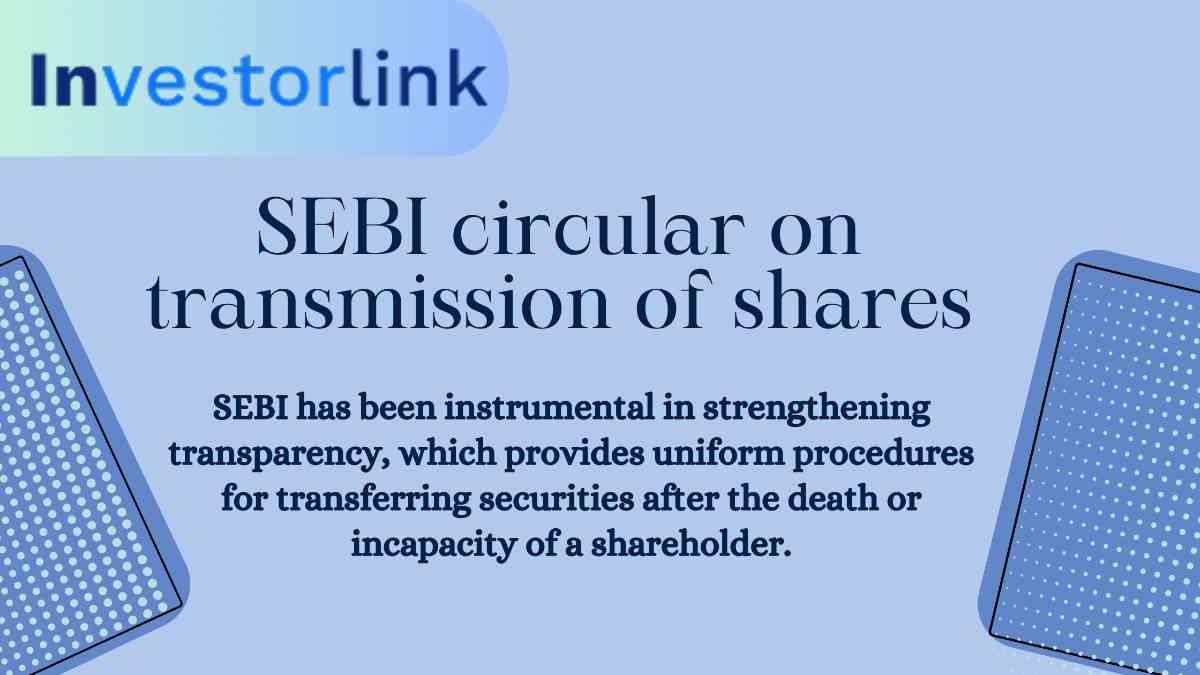

The transmission of shares is an important aspect of corporate law and securities regulation in India. When a shareholder passes away or becomes incapacitated, their shares need to be transferred to legal heirs, nominees, or successors. To streamline this process and safeguard the interests of investors, the Securities and Exchange Board of India (SEBI) issues detailed guidelines. The SEBI circular on transmission of shares plays a crucial role in ensuring clarity, reducing delays, and avoiding disputes.
In this blog, we will explore the meaning of transmission of shares, the key provisions under the SEBI circular, required documentation, and the overall compliance framework.
Transmission of shares refers to the transfer of ownership by operation of law, rather than a voluntary act of the shareholder. This generally happens in cases such as:
Unlike a normal transfer of shares, which is a contractual act between a buyer and seller, transmission is automatic and governed by company law and SEBI regulations.
Before SEBI intervention, transmission often involved long delays, excessive paperwork, and disputes between heirs. Many investors’ families faced difficulties in accessing shares due to unclear processes. To address these challenges, SEBI introduced a standardized framework for listed companies and registrars.
The objectives of the SEBI circular include:
Threshold for Document Requirement
Transmission requests up to a value of ₹5 lakh per listed entity can be processed based on basic documents like death certificate and KYC of claimant.
For higher values, companies may ask for additional documents such as succession certificate, probate of will, or letter of administration.
Time-Bound Processing
Transmission requests must be completed within 21 days of submission of required documents.
Any delay should be communicated to the claimant with reasons.
Nominee-Based Transmission
If a valid nomination exists, transmission is processed in the name of the nominee without requiring succession certificates.
No Dematerialization Delay
Transmission is applicable to both physical and demat shares, and companies must not delay dematerialization once transmission is completed.
Joint Holding Rules
In case of joint shareholding, transmission is carried out in favor of the surviving holder(s).
Mandatory KYC & PAN
Claimants must complete KYC requirements and submit PAN card details for compliance.
The transmission process involves the following steps:
The legal heir, nominee, or surviving holder must notify the company or Registrar and Transfer Agent (RTA) about the shareholder’s demise and request transmission.
Required documents are submitted based on the value and nature of the claim. These generally include:
The company or RTA verifies the documents. If additional documents are needed, the claimant is informed promptly.
Upon successful verification, the transmission is approved, and shares are transferred in the name of the claimant.
If the shares were held in physical form, the new holder may opt for dematerialization through a depository participant.
The SEBI circular imposes strict compliance requirements on listed companies and RTAs:
1. For Investors and Legal Heirs:
2. For Companies and Registrars:
Despite SEBI’s streamlined rules, claimants may still face challenges such as:
SEBI continues to address these gaps by issuing updated circulars and directives for smoother operations.
The SEBI circular on transmission of shares has brought much-needed clarity, speed, and investor protection to an otherwise complicated process. By setting clear timelines, simplifying documentation, and enforcing compliance, SEBI ensures that rightful heirs and nominees gain timely access to inherited securities.
For investors, it is equally important to register nominations and keep KYC details updated to avoid legal hurdles for their families in the future. Companies and registrars, on the other hand, must diligently follow SEBI’s framework to uphold investor confidence and regulatory compliance.
In short, SEBI’s initiative on transmission of shares is a step forward in making India’s securities market more transparent, fair, and investor-friendly.
Transmission of shares is the transfer of ownership that happens automatically by operation of law due to events like the death, insolvency, or incapacity of a shareholder. It is different from a voluntary transfer of shares between two parties.
The basic documents include:
As per SEBI circulars, transmission requests must be processed within 21 days of submission of complete documents by the claimant.
No, a nominee is not mandatory. However, if a nominee is registered, transmission becomes much simpler and does not require a succession certificate or court order.
In case of joint holding, transmission is done in favor of the surviving holder(s). The legal heirs of the deceased joint holder cannot claim the shares directly unless all surviving holders also pass away.
Yes. The SEBI circular applies to both physical and dematerialized shares. Once transmission is completed, physical shares can also be converted into demat form.
Yes, but only under valid grounds such as incomplete documentation, legal disputes among heirs, or suspicion of fraud. In such cases, the company must inform the claimant in writing with reasons.
For claims up to ₹5 lakh per listed entity, companies must process transmission based on minimal documents like death certificate and KYC. For amounts above ₹5 lakh, additional legal documents may be required.